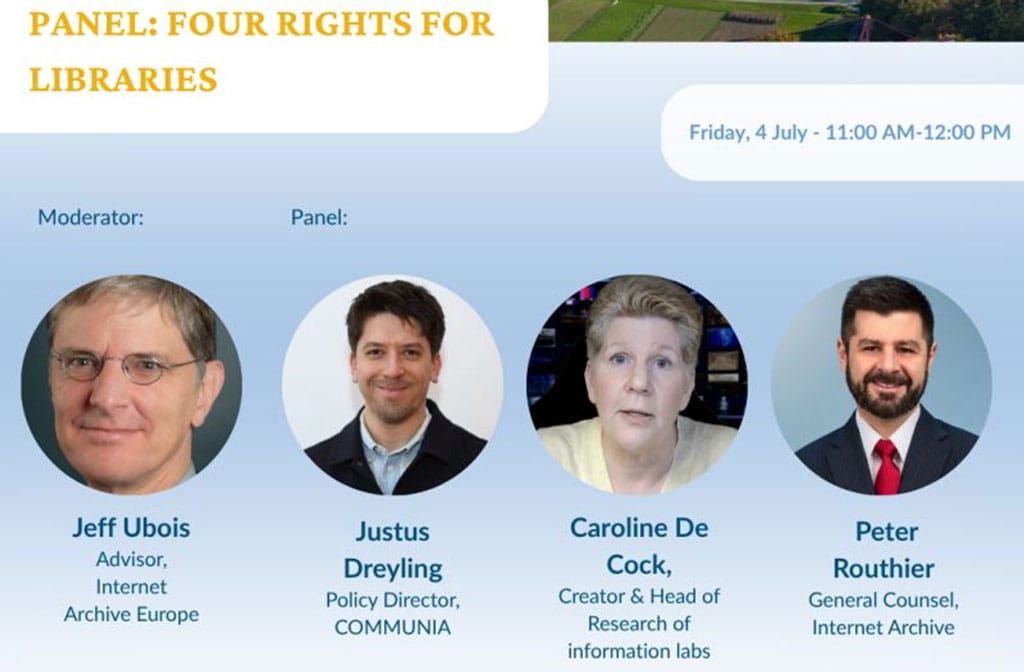Libraries have always been society’s great equalisers—gateways to knowledge, culture, and opportunity, open to everyone. But as the world moves from print to pixels, the fundamental ability of libraries to own and lend books is under threat. This isn’t just an inconvenience; it’s a direct challenge to our collective right to access digital materials, the third core principle of the Our Future Memory campaign supported by Internet Archive Europe.
Two recent publications shed crucial light on this struggle, mapping out both the problem and the path forward for memory institutions across Europe.
From Ownership to Expensive, Temporary Access
The core of the problem is a seismic shift in how we access digital content. As a recent COMMUNIA policy paper highlights, publishers are increasingly moving away from selling digital materials and are instead offering restrictive licenses. For libraries, this means they can no longer simply buy a book and own it forever. Instead, they’re trapped in a cycle of temporary, rental-like agreements that give publishers unprecedented control.
The consequences are stark. Libraries face exorbitant prices, “take it or leave it” subscription bundles filled with titles they don’t need, and terms that can forbid preservation, accessibility services, or inter-library loans. In some cases, publishers can even refuse to license essential e-books altogether, effectively creating gaps on our shared digital shelves. This reliance on licensing, a comprehensive study on e-lending in Europe by Knowledge Rights 21 concludes, “undermines the societal role of libraries by limiting their operational capabilities” and compromises fundamental user rights like privacy.
A Path Forward: Secure Digital Lending and the Right to License
So, what’s the solution? The Knowledge Rights 21 study offers a powerful, legally grounded model: (independent) Secure Digital Lending ((i)SDL).
This model is simple and fair: if a library legally owns a physical copy of a book, it should have the right to digitise it and lend out that single digital copy to one user at a time. This “one copy, one user” system mirrors traditional library lending and provides a vital backstop when publishers refuse to offer fair licensing terms. The study compellingly argues that this model is permissible under existing EU law, offering a clear path for libraries to reclaim their autonomy in the digital age.
The COMMUNIA policy paper builds on this by calling for broader legislative change. It argues that because access is a prerequisite for exercising rights like education and research, users need an enforceable “ancillary access right”. For libraries, this means an obligation on publishers to facilitate access through fair and reasonable licenses. Critically, any licensing terms that prevent a library from fulfilling its public mission—such as by charging unfair prices or restricting lawful uses—should be unenforceable.
Join the Conversation
To dive deeper into these critical issues, join the upcoming COMMUNIA Salon on “The Right to E-Lend.” This online event will be moderated by Peter Routhier from the Internet Archive and will feature experts discussing the challenges and solutions outlined in these essential reports. It’s a perfect opportunity to engage with the community and explore how we can collectively build a better digital future for our libraries.
- Event: COMMUNIA Salon: The Right to E-Lend
- Date & Time: Wednesday 24 September, 15:00-16:00 CEST
- Register here: https://mailchi.mp/communia-association/2wflwvvchh
Stand for Our Future Memory
Both of these reports arrive at the same conclusion: the current system is failing our libraries and, by extension, all of us. Securing the right to access, own, and lend digital materials is not a niche issue: it’s essential for ensuring that knowledge remains a public good, not a private, pay-per-view commodity.
This is precisely what the third right of the Our Future Memory campaign is all about. The ability of our memory institutions to build and preserve digital collections for future generations depends on our ability to act now.
The digital transformation of knowledge will continue regardless of whether memory institutions effectively advocate for their needs.
If your institution believes in a future where digital knowledge is owned, preserved, and accessible to all, it’s not too late to show your support. Join the growing list of signatories and stand with us.
Sign the statement at: www.ourfuturememory.org



